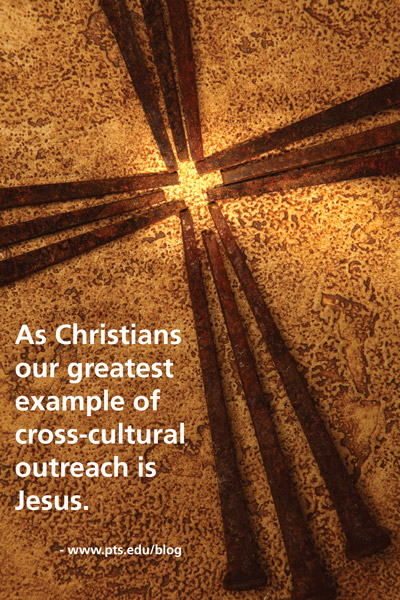Many times in our Christian faith we can become spiritually narcissistic internalizing the gospel as a personal salvation experience as opposed to a communal restoration. We try hard to separate our spiritual selves from the broader community, retreating to an isolated faith and distorted reality of Christendom. Our actions may model more so the religiosity of the Pharisees than that of the communal lived-out faith of Christ. Many of us are guilty of viewing this Christian faith through individualistic lenses as opposed to those of interdependence. As a result, we may not love our neighbor as ourselves, nor fight for her or his cause as if it were our own.
The thought of engaging those around can be challenging by itself, but even more so as we venture toward cross-cultural outreach. As Christians our greatest example of cross-cultural outreach is Jesus. He made his message relevant to the masses. He was known for hanging out with folks who would not necessarily be considered like him—publicans and sinners. He went against cultural norms by talking to a woman—a Samaritan!—and stayed even after she grew uncomfortable with the conversation. Jesus extended healing to the daughter of a woman from the region of Syro-Pheonicia. Later, Peter who took the good news to the household of the Italian Cornelius, and Paul whose travels spread all throughout the Roman Empire spread Christ’s gospel throughout other cultures.
Today, we live in a world where global has actually become local. In my son’s school in Pittsburgh, 29 languages are spoken. Local communities which could once be described as Polish, Jewish, African American or Italian are now finding themselves with non-singular ethnic identities. One of the greatest challenges for Christians is for our local churches across Pennsylvania, from Philadelphia to Erie, to become relevant to these new constituencies.
The cultural divides have stymied us from living out our faith in tangible ways throughout our communities. I have witnessed some local Pennsylvania churches passionately raise money for poor orphan children in some far off land while the poor orphan children in their church’s neighbor go neglected. Why is that?
Most people experience anxiety when faced with the need to approach someone seen as “other.” It is much easier to deal with the “other” who is far away, than to engage the “other” who is close by because then it becomes real. Then we become more vulnerable and risk the shift of our definition of “normal.” Then our engagement may not be as temporary as we may like. Then we might get exposed to realities that could make our “safe” bubble burst. Then we might be convicted to do something, turning our apathy into action.
If we also take the great commission seriously, then our work for Christ should be communal and have both local and global reaches. The life of every Christian should include some form of outreach that goes both across the street and across the world.
We are charged as Christians to face the challenges of our times head-on. We need churches that have cultural relevance and dare to go beyond their comfort zones in order to affect lasting change within their local communities and beyond.
Kimberly Merrell, an MDiv alumna of Pittsburgh Seminary, is the director of the Metro-Urban Institute at PTS.


Just read your piece above. The idea of transformation is great as long as it sits in Romans 12 & stays within predetermined boundaries. Any deviance means an imbalance in our stable universe, the notion of variable control.
We welcome the rescue of Jesus as it heralds our escape, a personal freedom restored. The individual nature of his grace pleases us as we celebrate our right to be free and it is declared finished on the cross of the King. No-one can take that away from us.
But hang on. Christ sacrificed comfort embracing hardships which lead to false arrest, torture & death. Jesus called his following to copy his example and they left the safe & familiar to do so. None stayed back and retired in the family home. They left it behind and died in service to the Lord.
Our witness is our word and work combined, our loves shaped by serving and sharing what we’ve got.
To love the the Saviour of John 3:16 means more than listening to CCM, wearing Christian T shirts and hating abortion clinicians. In fact we should love everyone rather than abuse them.
Loving others at church can be tough enough at times while loving our noisy neighbours 4 doors away can break people.
This expectation from Jesus to love strangers and help the vulnerable can be a step too far for some disciples.
Your article is both timely and essential reading for the church striving to be real and relevant to the world we’re in now.
The Lord’s all about sifting the dirt & restoring the gold so he’ll clear the rot to revive the righteous.
I’ve actually been looking out for those serving their communities & getting in touch to encourage them. Starting back on January 1st, I’ve committed 2022 to daily write to those ministering to an array of “neighbours” from chaplaincies to churches to homeless accommodation support.
Your article works in with what I’m doing & I’d love to know more about the stuff you’re doing in relation to this direction.
If you’d be up for a chat I’d love to cover your seminary in the writing I’m doing in the weeks & months ahead.
Even if you can’t, I hope you’re fired up for the week ahead. Keep going.
Be God’s
Paul McKay
May you be empowered by the hope of Christ, the joy of proving his love makes a difference and the wonder of watching it happen.